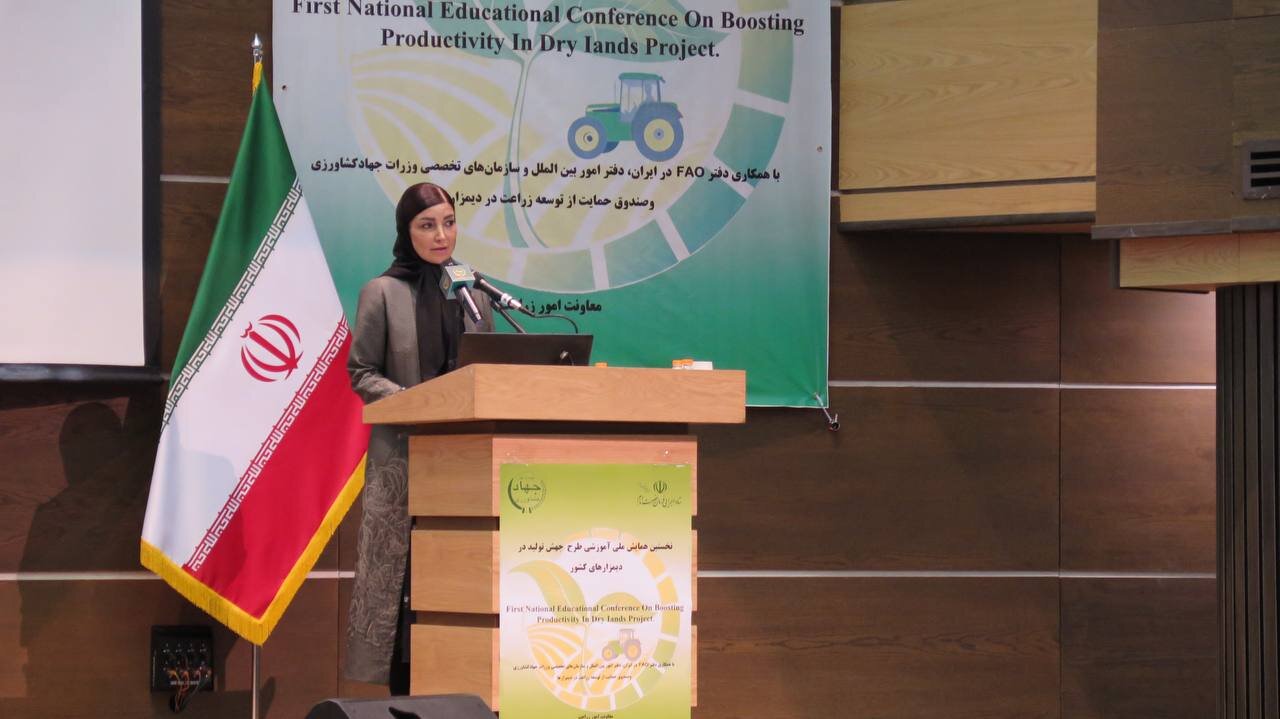FAO holds national conference on enhancing dryland agriculture productivity

TEHRAN – The Food and Agriculture Organization (FAO) of the United Nations held the “First National Conference on Enhancing Productivity in Dryland Projects” to discuss achievements within its project titled "Boosting Productivity and Unlocking the Potential of Dryland Agriculture."
The conference is underway in Tehran on 2-3 September in cooperation with the Agronomy Department of the Ministry of Agriculture Jahad (MAJ).
In a speech delivered by the officer in charge, Nazi Tavakoli, on behalf of FAO Representative ad interim to Iran, Yubak Dhoj GC, it was emphasized that the collaboration between FAO and the MAJ has yielded diverse and comprehensive results, ranging from capacity building to policy development, livestock management, and fisheries development.
Highlighting the substantial impact of these endeavors, GC remarked, "These efforts significantly bolstered sustainable agricultural practices, nutrition improvement, and rural livelihoods in Iran and paved the way for sustainable agricultural growth and rural development." He further expressed gratitude to the MAJ for their contributions to the joint project implementations.
Bo Zhou, FAO Agricultural Officer, for his part also shared insights during the conference, shedding light on key project objectives, strategic undertakings, and their far-reaching impact on the landscape of dryland agriculture.
The project's main mission centers on elevating agricultural productivity while safeguarding sustainability and fortifying food security. The challenge at hand is to identify the most effective way to realize this objective. In this context, conservation agriculture emerges as a dynamic solution, Zhou stated.
Conservation agriculture is an intensive farming system that prioritizes agricultural productivity while upholding principles of sustainability and resilience.
Collaborative efforts
Bo Zhou underscored the project's comprehensive approach, disseminating knowledge and fostering hands-on experience among various stakeholders.
Through extensive training programs and awareness initiatives, the project endeavors to educate government officials, extension staff, farmers, and private sector entities about the principles and advantages of conservation agriculture, he explained.
Innovation centers and technical advancements
Referring to the cooperation of the project with research institutes to increase the adaptability of conservation agriculture, he added that among the measures to achieve this goal is the creation of innovation centers in different provinces as a pole for technical advances and the introduction of adaptive machinery designed for conservation agriculture.
By addressing technical challenges, such as the availability of suitable crop varieties and germplasm, the project aims to lay the foundation for sustainable and productive agricultural systems, he also added.
Government capacity and addressing challenges
Zhou expressed confidence in the government's capacity to effectively execute the project, stating that while Iran is benefitting from well-equipped institutions, including research institutes, universities, and extension centers, the project addresses challenges such as upgrading machinery and cultivating suitable crop varieties resilient to dryland conditions, incorporating field tests and addressing seed variety limitations.
Water scarcity and conservation agriculture
Acknowledging the water scarcity challenge, Bo Zhou emphasized the potential of conservation agriculture to optimize water consumption and productivity in agricultural systems and stated that while it cannot single-handedly resolve the crisis, it contributes to mitigating water usage challenges.
Future focus and project impact
Emphasizing the importance of addressing technical gaps and increasing the awareness of stakeholders for the effective implementation of the project, he prioritized access to machinery, seeds, and crop varieties compatible with conservation agriculture and added that these efforts are lasting beyond the duration of the project amplifying its impact.
With continued support from the government, the project is poised to make a lasting impact on Iran's agricultural sector. By addressing technical gaps and promoting awareness, the project aspires to establish a resilient and sustainable agricultural landscape that prioritizes both productivity and environmental stewardship, he concluded.
Photo: Nazi Tavakoli, the officer in charge, on behalf of FAO representative ad interim to Iran.
(Photo by UN Iran)
Leave a Comment